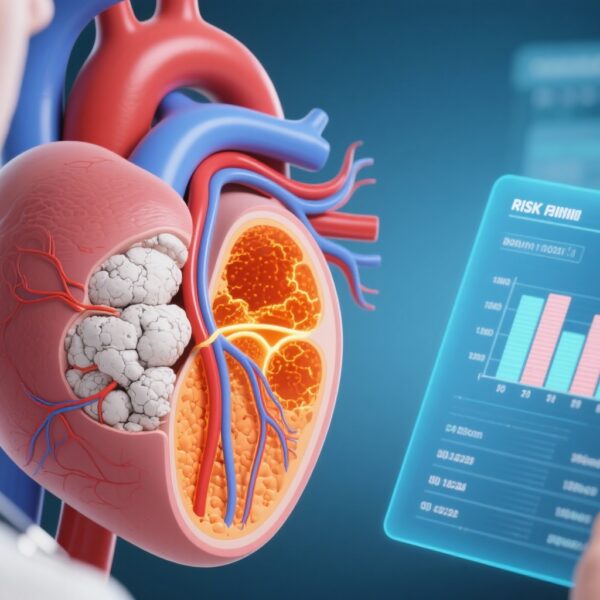Highlights
– In the DECAF randomized trial (n=200), allocation to caffeinated coffee consumption (~1 cup/day) after successful cardioversion reduced clinically detected AF or atrial flutter recurrence at 6 months versus complete abstinence (47% vs 64%; HR 0.61, 95% CI 0.42–0.89; P = .01).
– Absolute risk reduction was 17% over 6 months (number needed to treat ≈6); no significant difference in adverse events was reported.
– Study is the first randomized trial comparing caffeinated coffee consumption versus abstinence in patients with AF; findings challenge conventional advice to avoid caffeinated coffee to prevent AF recurrence but must be interpreted in light of the trial’s open-label design and population.
Background
Atrial fibrillation (AF) is the most common sustained cardiac arrhythmia, associated with stroke, heart failure, reduced quality of life, and substantial healthcare utilization. Patients and clinicians commonly ask whether lifestyle factors—including caffeine and coffee intake—modify AF risk. Conventional teaching and many patients’ beliefs hold that caffeinated coffee is proarrhythmic and therefore should be limited or avoided by people with AF. However, observational data have generally failed to show a consistent increase in AF incidence with usual coffee intake, and some studies have suggested neutral or even inverse associations. No randomized clinical trial had previously tested whether caffeinated coffee consumption after cardioversion influences AF recurrence.
Study design
The DECAF trial (Caffeinated Coffee Consumption or Abstinence to Reduce Atrial Fibrillation) was a prospective, open-label, randomized clinical trial enrolling 200 adults from five hospitals in the United States, Canada, and Australia between November 2021 and December 2024 (final follow-up June 5, 2025). Participants were current or recent (within 5 years) coffee drinkers presenting with persistent AF or atrial flutter with prior AF, and who underwent successful electrical cardioversion.
Key features:
- Randomization: 1:1 to caffeinated coffee consumption versus caffeine and coffee abstinence, for 6 months.
- Interventions: Consumption group encouraged to drink at least 1 cup of caffeinated coffee per day; abstinence group encouraged to avoid caffeinated and decaffeinated coffee and other caffeine-containing products.
- Baseline coffee intake: median 7 cups/week (IQR 7–18) in both groups.
- Primary endpoint: clinically detected recurrence of AF or atrial flutter over 6 months.
- Secondary outcomes: AF recurrence considered alone, adverse events.
- Trial registration: ClinicalTrials.gov NCT05121519.
Key findings
Two hundred participants (mean age 69 ± 11 years; 71% male) were randomized: 100 to caffeinated coffee consumption and 100 to abstinence. Adherence produced a clear between-group difference during follow-up: median intake 7 cups/week (IQR 6–11) in the consumption arm versus 0 cups/week (IQR 0–2) in the abstinence arm — a between-group difference of 7 cups/week (95% CI, 7–7).
Primary outcome:
- AF or atrial flutter recurrence occurred in 47% of the coffee consumption group and 64% of the abstinence group.
- Hazard ratio for recurrence with coffee consumption versus abstinence: 0.61 (95% CI, 0.42–0.89), P = .01 — a 39% relative risk reduction.
- Absolute risk reduction (ARR) over 6 months = 64% – 47% = 17% (95% CI for ARR not reported in the abstract). The number needed to treat (NNT) to prevent one clinically detected recurrence over 6 months ≈ 6 (1/0.17).
Secondary and safety findings:
- A comparable benefit was observed when considering AF recurrence alone (data reported in the article).
- No significant difference in adverse events between groups was reported in the abstract; specific adverse event categories and rates should be reviewed in the full publication for granularity.
Interpretation and clinical implications
The DECAF trial provides randomized evidence that, among recent or current coffee drinkers undergoing cardioversion for persistent AF (or atrial flutter with prior AF), continued moderate consumption of caffeinated coffee (~1 cup daily on average) was associated with substantially lower clinically detected recurrence of AF or atrial flutter over 6 months compared with complete abstinence from coffee and caffeine.
Clinical relevance: The magnitude of the effect is clinically meaningful — an ARR of 17% and an NNT of roughly 6 to prevent one recurrence at 6 months is large for a low-risk, low-cost behavioral intervention. If replicated, the findings would call into question routine blanket recommendations to avoid caffeinated coffee in patients with AF after cardioversion, and support a more individualized approach to counseling about caffeine use.
Biological plausibility and mechanisms
At first glance, a protective effect of caffeinated coffee seems counterintuitive because caffeine is a stimulant with sympathomimetic effects and can shorten atrial refractory periods in experimental settings. However, several considerations may reconcile the DECAF findings with biological plausibility:
- Habitual caffeine intake produces tolerance to many of the acute autonomic effects of caffeine, so typical daily coffee consumption may not provoke proarrhythmic autonomic shifts in regular drinkers.
- Coffee is a complex mixture containing hundreds of bioactive compounds (polyphenols, chlorogenic acid, diterpenes) that may exert anti-inflammatory, antioxidant, or metabolic effects that could reduce arrhythmogenic substrate.
- Observational epidemiology for coffee and cardiovascular outcomes (including several studies showing neutral or inverse associations with AF) suggests the net effect of habitual coffee intake is not uniformly proarrhythmic.
Strengths
– Randomized design is a major advance in this area of lifestyle and arrhythmia research, reducing confounding inherent to observational studies.
– Pragmatic intervention with excellent adherence as evidenced by a clear between-group difference in weekly cup intake.
– Clinically meaningful primary endpoint (clinically detected recurrence) relevant to patients and clinicians.
Limitations
– Open-label design: participants and clinicians were aware of allocation, which introduces potential bias in symptom reporting and clinical surveillance. The primary outcome relied on clinically detected episodes, which could be affected by differential care-seeking or monitoring.
– Study population: enrolled patients were current or recent coffee drinkers (within past 5 years) undergoing cardioversion for persistent AF or atrial flutter; results may not generalize to lifetime non–coffee drinkers, those with paroxysmal AF, or different demographic groups (trial participants were largely male and older).
– Dose and form: the consumption arm averaged ~1 cup/day; effects of higher consumption, different brewing methods, or other caffeinated beverages remain unknown.
– Duration: follow-up was 6 months; durability of effect beyond this timeframe is uncertain.
– Adverse-event detail: the abstract reports no significant difference in adverse events, but full safety data (arrhythmia-related hospitalizations, symptomatic burden, blood pressure, sleep disturbance, etc.) require careful review in the full article.
Implications for practice and research
For practicing clinicians counseling patients after cardioversion, DECAF suggests that advising habitual coffee drinkers to completely avoid caffeine may not reduce AF recurrence, and moderate caffeinated coffee intake could be safe and potentially beneficial. However, clinicians should individualize counsel, considering comorbidities (e.g., uncontrolled hypertension, anxiety, insomnia), patient preferences, and potential interactions with other stimulants or medications.
Key research questions that remain include replication in broader and more diverse populations, evaluation of different coffee doses and forms, mechanistic studies to clarify pathways, and assessment of patient-centered outcomes such as symptom burden and quality of life. Trials using blinded, objective rhythm monitoring (continuous ambulatory ECG) would help reduce detection bias.
Conclusion
The DECAF randomized clinical trial provides novel evidence that, among recent coffee drinkers undergoing cardioversion, allocation to caffeinated coffee consumption averaging about one cup daily was associated with lower 6‑month clinically detected recurrence of AF or atrial flutter compared with abstinence. These findings challenge the common clinical advice that caffeinated coffee provokes AF and support a more nuanced approach to counseling patients. Confirmation in additional randomized studies and longer-term follow-up will inform guidelines and practice.
Funding and trial registration
Trial registration: ClinicalTrials.gov Identifier: NCT05121519. Funding sources were not specified in the provided abstract; see the full JAMA article for detailed funding and conflict-of-interest statements.
References
1. Wong CX, Cheung CC, Montenegro G, et al. Caffeinated Coffee Consumption or Abstinence to Reduce Atrial Fibrillation: The DECAF Randomized Clinical Trial. JAMA. 2025 Nov 9. doi: 10.1001/jama.2025.21056. Epub ahead of print. PMID: 41206802.
2. Hindricks G, Potpara T, Dagres N, et al. 2020 ESC Guidelines for the diagnosis and management of atrial fibrillation developed in collaboration with the European Association for Cardio-Thoracic Surgery (EACTS). European Heart Journal. 2021;42(5):373–498. doi:10.1093/eurheartj/ehaa612.
Note: For additional context and detailed methods, monitoring protocols, and safety outcomes, consult the full DECAF trial publication in JAMA.



